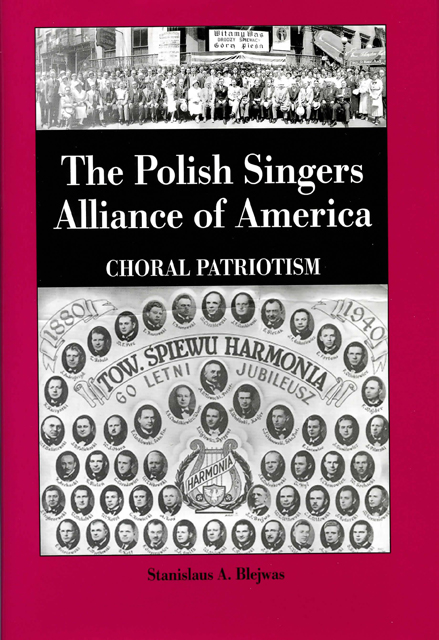Book contents
- Frontmatter
- Contents
- List of Illustrations
- Foreword
- Acknowledgments
- Introduction
- 1 “To Sing Out the Future of Our Beloved Fatherland”
- 2 Pieśni o ziemi naszej (Songs of Our Land)
- 3 The Convention of “Unhappy Memory”
- 4 “Active Duty”
- 5 “Cultural Care”
- 6 World War II and a New Immigration
- 7 The Czechlewski Years: The Ideological Organization Redefined
- 8 Polish American Choral Culture
- 9 “Let Poland Be Poland!”
- 10 Quo Vadis Polish Song in North America?
- Appendix A PSAA National Officers
- Appendix B National Conventions
- Appendix C Individual Choirs
- Appendix D Honorary Members
- Appendix E Compositions of Antoni Małłek Celebrating the Holy Trinity Immigrant Neighborhood in Chicago
- Appendix F Membership
- Appendix G Hlond Trophy Winners
- Appendix H Children’s Choirs
- Appendix I Selected Biographies
- Appendix J Competition Songs, Winning Choirs, and Free Selection at National Conventions of the Polish Singers Alliance of America
- Appendix K Guest Artists and Selections Performed at National and International Conventions of the Polish Singers Alliance of America, 1905–1998
- Appendix L Songs Sung by Choirs at Concerts of the National and International Conventions of the Polish Singers Alliance of America
- Appendix M PSAA Districts and Choirs—1999
- Notes
- Bibliography
- Index
2 - Pieśni o ziemi naszej (Songs of Our Land)
Published online by Cambridge University Press: 17 March 2023
- Frontmatter
- Contents
- List of Illustrations
- Foreword
- Acknowledgments
- Introduction
- 1 “To Sing Out the Future of Our Beloved Fatherland”
- 2 Pieśni o ziemi naszej (Songs of Our Land)
- 3 The Convention of “Unhappy Memory”
- 4 “Active Duty”
- 5 “Cultural Care”
- 6 World War II and a New Immigration
- 7 The Czechlewski Years: The Ideological Organization Redefined
- 8 Polish American Choral Culture
- 9 “Let Poland Be Poland!”
- 10 Quo Vadis Polish Song in North America?
- Appendix A PSAA National Officers
- Appendix B National Conventions
- Appendix C Individual Choirs
- Appendix D Honorary Members
- Appendix E Compositions of Antoni Małłek Celebrating the Holy Trinity Immigrant Neighborhood in Chicago
- Appendix F Membership
- Appendix G Hlond Trophy Winners
- Appendix H Children’s Choirs
- Appendix I Selected Biographies
- Appendix J Competition Songs, Winning Choirs, and Free Selection at National Conventions of the Polish Singers Alliance of America
- Appendix K Guest Artists and Selections Performed at National and International Conventions of the Polish Singers Alliance of America, 1905–1998
- Appendix L Songs Sung by Choirs at Concerts of the National and International Conventions of the Polish Singers Alliance of America
- Appendix M PSAA Districts and Choirs—1999
- Notes
- Bibliography
- Index
Summary
The origin of Polish music in America is traced to the appearance of Felix Yaniewicz, an esteemed violinist, conductor, and composer who visited the young American republic sometime in the early nineteenth century. In 1805, Yaniewicz published in Philadelphia a song, “The Birth Day of Freedom,” to celebrate the American victory in the war with Tripoli. He also published a rondo, “The Indian War Whoop,” and his works appeared in several collections of music published in the United States. Polish musical activities increased following the arrival of émigrés who made their way to New World after the defeat of the November 1830 Insurrection. This small political immigration landed when there were neither Polish settlements nor organizations, nor an organized Polonia. Many insurgents were gentry. They possessed some education, and established the first Polish organizations in America. Among these exiles were a few talented composers and musicians. While their compatriots employed their cultural talents to propagate the cause of Polish independence in Europe, the new arrivals did likewise in America. Adam Kurek dedicated marches to the leaders of the November Insurrection, and Edward Bohuszewicz composed waltzes and mazurkas with romantic titles like The Polish Pilgrim and The Memory of a Polish Exile, as well as a Selection of Polish Aires. Polish patriotic songs such as The Polonez of the Third of May and The Varsovienne [Warszawianka] were also published, and Paweł Sobolewski translated and printed, “Poland is not lost.” However, these early political exiles were too small to imprint anything more than a faint, albeit positive, image of Poland upon the popular American consciousness.
The January 1863 Insurrection renewed political activity on Poland's behalf, and, after the Insurrection's defeat, a new generation of political émigrés found their way to the United States. At the same time, the growing rural immigration from partitioned Poland fundamentally changed the character of Polish life in America. As the immigrants congregated in cities, they organized the parishes and societies that became the infrastructure of American Polonia. And as the immigrants developed their social life, their inner needs and emotions found their necessary expression in cultural activities.
- Type
- Chapter
- Information
- The Polish Singers Alliance of America 1888-1998Choral Patriotism, pp. 22 - 35Publisher: Boydell & BrewerPrint publication year: 2005



